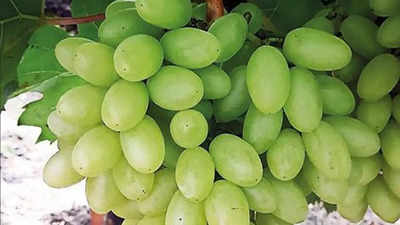- News
- City News
- nashik News
- Early grape harvest begins in Nashik’s Satana taluka
Trending
This story is from November 22, 2021
Early grape harvest begins in Nashik’s Satana taluka
Early harvest of grapes has begun in the grape-growing belt of Satana taluka in Nashik district. Currently, around 150 tonne of grapes are being harvested per day on an average and sent to north India. In addition, the grapes are also being exported to Russia from here.

Currently, around 150 tonne of grapes are being harvested per day
NASHIK: Early harvest of grapes has begun in the grape-growing belt of Satana taluka in Nashik district.
Currently, around 150 tonne of grapes are being harvested per day on an average and sent to north India. In addition, the grapes are also being exported to Russia from here.
Usually, the regular grape harvest season in Nashik district begins from the second-half of January.It peaks in February and March, and ends by April. On the contrary, early grape harvest begins in November and ends by December-end in Satana taluka of the district.
The early grape harvest takes place on 6,000 acre of the total 2 lakh acre under grape plantation in the district. “Early grape season has begun in Satana and nearby areas and will continue till December-end by the time the regular grape harvest season begins,” Manik Patil, a senior office-bearer of Maharashtra Rajya Draksha Bagayatdar Sangh, said.
“But there has been no damage to the vineyards this time and the early grape harvest season is on in full swing. We are also getting good rates in both international and domestic markets. We are getting Rs 100 per kg price in the domestic market this year, against the price of between Rs 70 and Rs 80 per kg last year,” he said.
“We are also exporting grapes to Russia where we are getting Rs 110 per kg this year, against Rs 80 per kg last year,” he added.
Currently, around 150 tonne of grapes are being harvested per day on an average and sent to north India. In addition, the grapes are also being exported to Russia from here.
Usually, the regular grape harvest season in Nashik district begins from the second-half of January.It peaks in February and March, and ends by April. On the contrary, early grape harvest begins in November and ends by December-end in Satana taluka of the district.
The early grape harvest takes place on 6,000 acre of the total 2 lakh acre under grape plantation in the district. “Early grape season has begun in Satana and nearby areas and will continue till December-end by the time the regular grape harvest season begins,” Manik Patil, a senior office-bearer of Maharashtra Rajya Draksha Bagayatdar Sangh, said.
Farmers have said that they are fetching good rates this season in both export as well as the domestic market. Khanderao Shevale, a grape farmer who planted grapes on 70 acre land in Satana, said farmers had to incur heavy losses in the last grape season due to unseasonal rainfall.
“But there has been no damage to the vineyards this time and the early grape harvest season is on in full swing. We are also getting good rates in both international and domestic markets. We are getting Rs 100 per kg price in the domestic market this year, against the price of between Rs 70 and Rs 80 per kg last year,” he said.
“We are also exporting grapes to Russia where we are getting Rs 110 per kg this year, against Rs 80 per kg last year,” he added.
End of Article
FOLLOW US ON SOCIAL MEDIA










